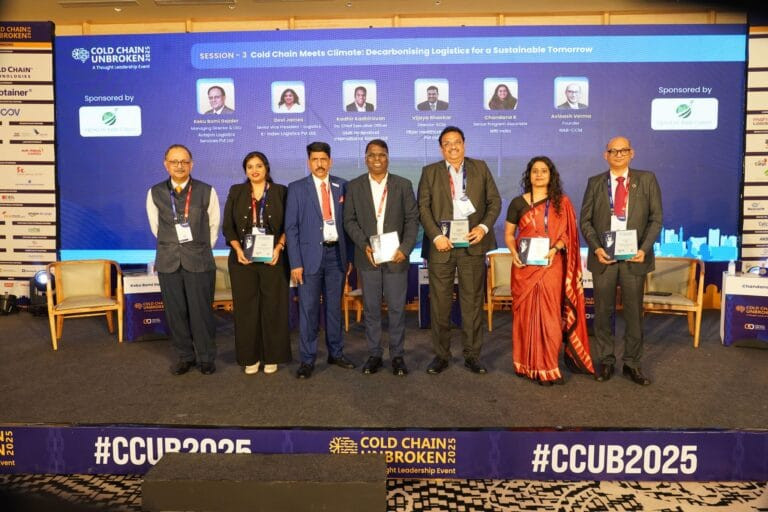- The cold chain industry is under pressure to innovate while reducing its environmental impact, covering temperature-sensitive goods from pharmaceuticals to perishables. Leaders stress that achieving net-zero requires energy-efficient technologies, renewable energy integration, and data-driven operational strategies.
- Technology and policy play a central role. Energy-efficient refrigeration, renewable power, IoT monitoring, and data analytics help optimise routes, reduce emissions, and improve compliance. Governments can accelerate adoption through regulations and subsidies for green solutions.
- Infrastructure investment is critical, especially in emerging markets. Upgrading facilities to green standards, supported by public-private partnerships, alongside digitalisation for real-time monitoring, traceability, and waste reduction, positions the sector for both operational efficiency and sustainable growth.
From pharmaceuticals to perishables, the cold chain industry faces mounting expectations to innovate, invest in green infrastructure, and leverage digital technologies, all while aligning with emerging regulatory frameworks.
Encompassing the transportation and storage of temperature-sensitive goods such as pharmaceuticals and perishables, the cold chain is a significant contributor to global greenhouse gas emissions. Addressing this requires a comprehensive approach that integrates sustainability into every facet of the supply chain.
As emphasised by Keku Bomi Gazder, Managing Director and CEO of Aviapro Logistic Services Pvt Ltd, “The cold chain industry is at a critical juncture. We must innovate not just to meet demand but to do so in an environmentally responsible manner.”
This perspective aligns with the broader industry consensus that achieving net-zero emissions necessitates a paradigm shift towards sustainable practices. This includes the adoption of energy-efficient technologies, renewable energy sources, and data-driven strategies.
Innovation and alignment
Devi Jessie Mary James Melchior, Senior Vice President – Logistics at K-Indev Logistics, highlighted the role of technology in reducing the carbon footprint of cold chain operations. “Implementing energy-efficient refrigeration systems and leveraging renewable energy sources can significantly lower emissions,” she noted. “Moreover, adopting data analytics allows for optimising routes and reducing fuel consumption.”
Chandana K, Senior Programme Associate at WRI India, presented insights into policy frameworks that can incentivise sustainable practices. “Governments play a crucial role by introducing regulations that mandate energy efficiency and by providing subsidies for green technologies,” she stated. “Such policies can accelerate the adoption of sustainable practices across the industry.”
These technological advancements and policy initiatives are essential for creating an ecosystem that supports decarbonisation efforts. The integration of renewable energy sources, such as solar and wind, into cold storage facilities can substantially reduce reliance on fossil fuels. Additionally, the implementation of energy-efficient refrigeration systems can lower energy consumption and associated emissions.
Infrastructure challenges and investment needs
Kadhir Kadhiravan, Deputy CEO of GMR Hyderabad International Airport Ltd, discussed the infrastructural challenges in implementing sustainable cold chain solutions. “Upgrading existing facilities to meet green standards requires substantial investment,” Kadhiravan explained. “However, the long-term benefits, including reduced operational costs and compliance with international standards, justify the expenditure.”
The need for infrastructure investment is particularly pressing in emerging markets, where cold chain facilities may be outdated or insufficient to meet growing demand. Public-private partnerships can play a pivotal role in financing these upgrades, ensuring that sustainability is embedded into the foundational infrastructure of the cold chain sector.
Digitalisation as a catalyst for sustainability
Avinash Verma, Founder of NAB-CCM, emphasised the transformative potential of digital technologies in enhancing sustainability. “IoT-enabled sensors and blockchain can provide real-time monitoring and traceability, ensuring compliance with temperature requirements and reducing waste,” Verma explained. “Digitalisation not only improves efficiency but also contributes to sustainability by minimising resource wastage.”
The adoption of digital technologies facilitates real-time visibility across the cold chain, enabling stakeholders to monitor and manage shipments proactively. This capability is crucial for maintaining product quality and reducing spoilage, thereby minimising waste and associated emissions.




